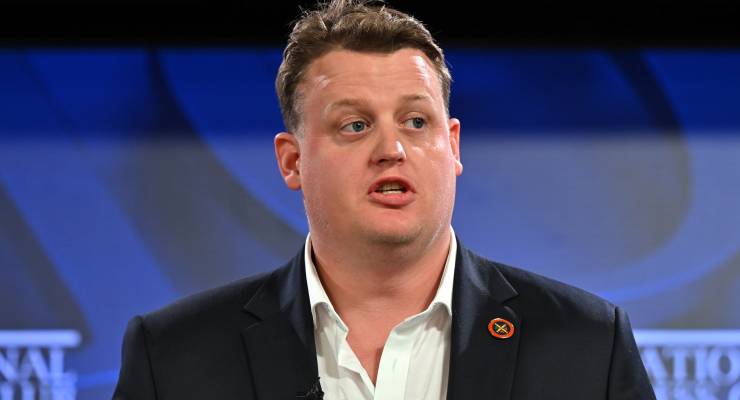
Tucked away in a stall-lined corridor on the plaza level of the Brisbane Convention Centre, the 2023 ALP national conference fringe program, off to the side of the official 49th ALP national conference, was a kind of mini-Ekka sideshow alley; think fewer show bags and livestock, more panel discussions and workshops.
Run in tandem with the main proceedings, the fringe presents an important opportunity for party members, observers, delegates, MPs and the public — the latter admittedly in limited attendance — to engage with lobbyists, NGOs, factions, and interest groups. To wit, there was a stall for BirdLife Australia; another for EMILY’s List; ones for Safe Ground, the Australia Palestine Advocacy Network, Make it 16, Rainbow Labor, Young Labor, and the Labor Environment Action Network (LEAN) among a host of other groups within and without the ALP.
It had a broad program, with topics ranging from ending native forest logging to Australia’s response to the Biden administration’s Inflation Reduction Act; from lowering the voting age to expanding Australian foreign aid; from closing the gender pay gap to implementing drug reform.
It’s a commendable initiative in a lot of ways — can you ever, ever imagine the Coalition doing this? — even if the turnout of the rank-and-file was often a little lacking. To this point: the 2023 fringe was, well, kind of an odd one, as Margaret Beavis, co-chair of the International Campaign to Abolish Nuclear Weapons (ICAN) explains:
[The fringe] is completely separate from the conference. It’s in the same building, but you have to go in and out of several entrances … Some of the delegates have to pay additional money to attend.
ICAN, the 2017 Nobel peace prize-winning organisation — which counts among its senior staff former Labor member for Fremantle Melissa Parke — was at fringe to rally the government to make a firm commitment to ratifying the treaty on the prohibition of nuclear weapons, which Anthony Albanese committed to do in 2018 while in opposition. Beavis explains how the government’s approach of exploiting a loophole in the 1968 nuclear non-proliferation treaty poses a high risk of nuclear proliferation globally, as other countries will be likely to demand the same privilege to stockpile nuclear materials.
In Beavis’ opinion, the placement of this year’s fringe far away from the national conference had a dampening effect on the cut-through of ICAN’s message, and that of other groups.
The lobby groups and interest groups that have come to this conference have been shunted to one side and that’s really disappointing … I hope that doesn’t get repeated at further conferences.
The outer fringes
But this wasn’t the only fringe program in play. Outside the conference, thousands of demonstrators assembled to rally on issues ranging from the climate crisis and treatment of First Nations peoples to taxing big business super profits and banning the use of hazardous manufactured stone in construction. AUKUS is firmly on the agenda, too.
Over several days, speakers from myriad activist, union and Labor factions — including Larissa Baldwin-Roberts from GetUp, Sam Watson the fifth, Zach Smith from the Construction Forestry Maritime Energy Union, Peter Ong from the Electrical Trades Union, Parke from ICAN, Marcus Strom from Labor Against War (LAW) and defence whistleblower David McBride — held court in front of the assembly.
Makeshift marching bands bashed through rickety parody pop covers; a towering photo of Julian Assange was suspended by the security fencing next to anti-war placards; a zeppelin-like papier-mâché submarine bobbed above the crowd. Notably, unlike the fringe, admission was free.
Sam Watson, a young freelance filmmaker, activist and grandson of the late Aboriginal activist Samuel William Watson, explains his reasons for showing up:
I’ve come today to protest the Labor Party … and say that we demand better than the lesser of two evils when it comes to Labor and the LNP.
Watson was strident in his criticism of Labor, pointing to the extinguishment of native title rights in Queensland for mining, fracking in the Northern Territory’s Beetaloo Basin, the destruction of historical and cultural sites under state Labor governments, the failure to raise the age of criminal responsibility and a raft of others issues.
We demand justice and actual change, not just well-meaning sentiment.
Strom, a journalist and former Labor staffer, is co-founder and national convenor of LAW. He was an observer at the official conference, but took time to speak out against AUKUS at the demonstration.
We’re here to make sure the voice of the rank and file is heard at this conference … Overwhelmingly …ordinary Labor Party members oppose AUKUS. They’re not getting a hearing here.
With more than 50 of Labor’s roughly 800 branches passing anti-AUKUS motions, Strom bemoaned the lack of democratic representation on display at the conference:
There won’t even be an opportunity for Labor Party delegates to vote AUKUS out of the national platform … We don’t understand why they’re running from democracy, why they’re running from the rank and file.
The party line
Back at the official conference fringe, not everything was up for such candid debate. A former political insider there who chose to remain off the record said the stall vetting process for the fringe, in keeping with the overarching tone of the national conference, was stage-managed. Event organisers reportedly vetoed an application for an official LAW stall and a proposed panel discussion by ICAN co-founder Dave Sweeney on nuclear waste disposal.
Many Labor supporters, particularly the young, were guarded in conveying their opinions on the hot-button issues — affordable housing, tax reform, renewables, the Voice, the climate crisis, and AUKUS– in even the most basic terms. Most decline to be interviewed, and those who spoke did so on background.
“We’ve got to run before we can walk,” said one young Labor supporter on the climate crisis and radically cutting back fossil fuels investment. “A necessary evil,” said another about AUKUS. And on housing: “We’re getting there.”
Another on the government’s messaging on the Voice said: “Most people I speak to support it, after I explain it to them.” And on ending native forest logging: “What about forestry jobs?”
Bland platitudes and party spin abounded.
Not all are so reserved. Kathy, early 70s, a public health researcher and 35-year member of the ALP, came from Tasmania to observe the conference. As a member of LEAN, and concerned about deforestation and the exhaustion of swift parrot habitat in her native state, she was frank in her assessments: stage three tax cuts? “They’ve got to go.” AUKUS? “I’m a Quaker … I’m opposed to any militarisation.” The messaging around the Indigenous Voice to Parliament? “I don’t know that enough has been done for the Yes campaign, but it’s difficult when the media is controlled by the Murdoch press.”
It was a refreshingly frank exchange in a fringe that, despite itself, seemed underwritten by party censorship.








There was more ALP relevance outside the Convention Centre than indoors at the official talkfest – the latter was a stage-managed propaganda event.
Yes. There was no real discussion. Albo’s party came in with a ‘my way or the highway’ attitude and handed out rubber stamps to everyone present. Doug Cameron and others may has suggested a different use for the stamps, but they were ignored, overruled, and deemed irrelevant. They may have been allowed to speak, but they were not allowed to be heard.
Currently there are 32 countries with nuclear reactors, stockpiling used nuclear fuel, and increasing as more and more countries decarbonise using nuclear energy. While those stockpiles remain accessible for recycling, they represent a major threat to the fossil fuels industries. The fission of every tonne of recycled nuclear fuel averts millions of tonnes of CO2 and displaces the sale of millions of tonnes of coal or gas. The fossil industries spend billions of dollars every year to spread misinformation to obstruct the expansion of nuclear energy, including the stockpiling of used nuclear material.
Well-burnt nuclear fuel is useless to make reliable bombs. It is of no concern for the NPT and should be no concern for ICAN, unless their paymasters insist.
One of Ben and stiller’s docos once postulated that one square kilometre is all that’s needed to store all the world’s nuclear waste. While I’m against having nuclear power plants here, I could see somewhere remote, maybe on WA’s coast, and not under any cultural constraints, being made available for such storage. We could build a military base there to guard it. We could charge the rest of the world hundreds of billions dollars. It would add to our security without having to spend a trillion on useless subs, as no nation would countenance ‘enemies’ getting their hands on it. It’s just a thought experiment and of course it will never happen, but sounds like a win win to me.
A similar proposal was put forward by Pangaea Resources Australia PL in 1988. The idea was that democratic countries pressured by strong antinuclear movements would send their used fuel to an underpopulated part of Australia that would welcome the rent for an underground repository. While technically sound, the proposal was politically naïve.
I would prefer that used fuel be recycled, and the tiny residue of fission products should be buried in boreholes deep under the same city that consumed its energy. Better than the equivalent volume of CO2 spread over the entire world!